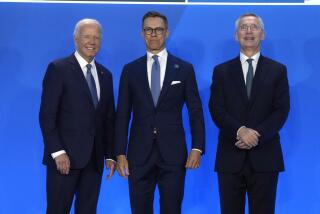Summit Underscores Intent to Proceed With NATO Expansion
- Share via
HELSINKI, Finland — Despite Russian President Boris N. Yeltsin’s protest that expansion of NATO is “a mistake and a serious one,” the Helsinki summit virtually guarantees that the alliance--originally created to block Soviet ambitions--will enter the 21st century with some of Moscow’s former satellites as full members.
At a post-summit news conference Friday, President Clinton was succinct: “NATO enlargement in the Madrid summit will proceed.”
And with that, one of the knottiest U.S.-Russian disputes of the post-Cold War era seemed to come to an end.
Although Yeltsin did not retreat from his opposition to NATO enlargement, he seemed to acknowledge that he is powerless to block it.
White House National Security Advisor Samuel R. “Sandy” Berger said the Russian president “pressed the position that they still don’t like NATO enlargement, but they are going to deal with it.”
Presidents and prime ministers of the North Atlantic Treaty Organization will meet in Madrid in July to select candidates--almost certainly Poland, Hungary and the Czech Republic--that will join the alliance before the end of 1999.
Although Yeltsin continued to object to NATO’s expansion plans, the two presidents called for accelerated negotiations on a new charter between Russia and NATO that would establish a forum for military and political cooperation between Moscow and the 16-nation alliance.
Although the United States and its allies originally suggested the charter as a way to ease Russian objections to NATO expansion, Clinton and Yeltsin agreed that the plan is a good idea regardless of the outcome of the expansion dispute.
One U.S. official said the proposed charter would result in an exchange of information about military planning between Russia and the alliance, a step that could prevent conflict.
“We believe that information is good,” the official said. “The more the Russians know about what NATO is doing, the better.”
Of course, there will be secrets, he added, “but there is an awful lot we can tell them.”
In the end, both presidents stuck with the positions they had staked out over the past three years, when NATO first considered adding new members. But after months of trying to bury the expansion under a torrent of rhetoric, Yeltsin seemed to acknowledge that he cannot prevent the alliance from going ahead.
A joint statement, signed by Clinton and Yeltsin but referring to themselves in the third person, said: “They continued to disagree on the issue of NATO enlargement.
“In order to minimize the potential consequences of this disagreement, the presidents agreed that they should work, both together and with others, on a document that will establish cooperation between NATO and Russia as an important element of a new, comprehensive European security system,” the statement added.
The actual charter negotiations are being handled by NATO Secretary-General Javier Solana and Russian Foreign Minister Yevgeny M. Primakov.
The talks began in January, but progress has been slow because of Russia’s reluctance to approve anything that seemed to sanction NATO expansion.
The negotiations are now expected to make much faster progress.
Clinton and Yeltsin made clear at their Friday news conference that they hope to finish work on the charter in time for the Russian leader to meet the 16 NATO presidents and prime ministers before the Madrid meeting to demonstrate Russia’s standing as a major power in Europe.
By papering over his dispute with Yeltsin, Clinton undercut one of the arguments advanced by American opponents of NATO expansion: that adding new members is not worth the cost of renewed friction between Washington and Moscow.
So far, NATO expansion has been a popular idea in the United States. A demand to add Poland, Hungary and the Czech Republic was the only major foreign policy clause in the Republicans’ 1994 “contract with America” election manifesto.
Bob Dole, the GOP’s 1996 presidential candidate, berated Clinton for dragging his feet on NATO enlargement.
Under these circumstances, administration officials anticipate little trouble in obtaining required Senate approval of the new members.
With the admission of the first three countries now virtually certain, attention is turning to additional countries that also may be eligible.
U.S. officials say Italy and Germany are pushing for inclusion of Slovenia, and France is sponsoring Romania, either in the first group or in an early second expansion. Slovenia’s backers say it is time to reward the former Yugoslav republic for its democratic reforms and for avoiding the ethnic warfare that has shattered neighboring countries such as Bosnia-Herzegovina.
However, U.S. officials say Slovenia and Romania seem to have several opponents, enough to keep them out of the alliance, which acts only by unanimous agreement.
In addition to the NATO-Russia charter plan, Clinton sought to ease Yeltsin’s concerns by writing into the summit communique a decision by NATO foreign ministers last December that the alliance would not deploy nuclear arms on the territory of the new members.
Clinton also agreed to enhance the “operational capability” of the Organization of Security and Cooperation in Europe.
More to Read
Sign up for Essential California
The most important California stories and recommendations in your inbox every morning.
You may occasionally receive promotional content from the Los Angeles Times.










